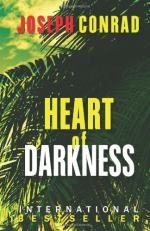|
This section contains 846 words (approx. 3 pages at 300 words per page) |

|
A Comparison of Heart of Darkness and Deliverance
Summary: Compares James Dickey's Deliverance and Joseph Conrad's Heart of Darkness. Describes how each author's visions of the "unethical" world outside of society are shown to their readers. Considers whether or not morality exists outside of society.
In both James Dickey's Deliverance and Joseph Conrad's Heart of Darkness, visions of the "unethical" world outside of society are shown to their readers. Marlow and the campers all eventually realize that in a survival situation in the wilderness, there is no "right and wrong," as life suddenly changes for them. Surviving becomes Darwin's ideology of "survival of the fittest," where the strongest people set the rules. Outside of "civilization," Man cannot be judged in the same manner as he is inside a city. There is no law or person that will protect another man in the forest. Both Marlow and Ed discover that Man is not truly moral, when left to his own devices, and that the only actions worth doing are ones in which benefit them. We, as a species, are by nature asocial and destructively rapacious.
As Marlow travels farther and farther into the Congo...
|
This section contains 846 words (approx. 3 pages at 300 words per page) |

|


